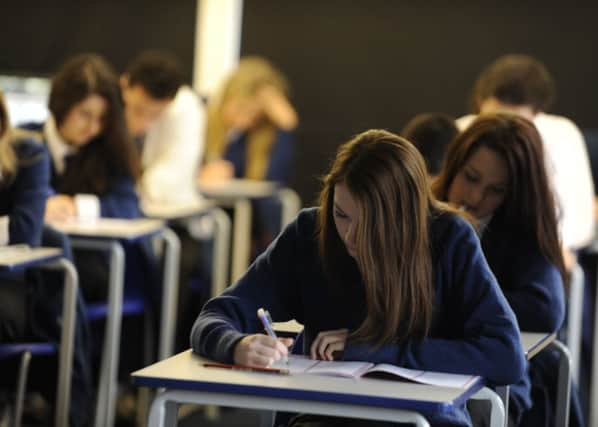Tam Baillie: Children are the real education experts


Last week, the First Minister welcomed an “expert international panel” to Scotland, tasked with scrutinising Scottish Government plans to improve the education system.
During the first meeting of the panel, the ten members of the new International Council of Education Advisers heard from pupils and teachers across Edinburgh and East Lothian. The group was set up after May’s Scottish Parliament elections to scrutinise plans aimed at closing the attainment gap between rich and poor pupils in Scotland’s schools.
Advertisement
Hide AdAdvertisement
Hide AdWhile the contributions of experts from the US, Canada, Finland, Norway, Sweden, Malaysia, Australia and the UK will be welcome, the answers may already be found closer to home and from another group with unique insight into current education policy: children and young people themselves.
Two years ago, my office conducted research on pupil attainment and specifically examined why some schools do remarkably well while serving largely poor socio-economic areas. This research was commissioned following a literature review, an Ipsos MORI survey and statistical analysis which identified schools performing much higher than their proportion of pupils living in poverty would predict.
A number of secondary schools with catchments in more deprived areas of Scotland were identified as having higher than expected exam results. Seven of these schools were invited to take part.
The goal of this research was to find out if schools serving deprived areas distinctively supported pupil achievement and attainment, through recognising pupils’ rights and allowing them to actively take part in decision making in the widest possible sense.
It focused entirely on the pupils’ perspective rather than on the adults in the school and sought to explore how pupils themselves would describe the links between different kinds of participation and “doing well”. “Doing well” meant both attainment (such as test scores, examination grades and formal qualifications) and achievement (wider success and development). Our research found that young people definitely saw a connection.
In schools that do well, we found that there was a shared understanding among pupils and staff of the value of participation across all areas of school life: from planning for the formal curriculum and the informal curriculum, to having a place on decision-making groups and other places of informal contact among peers and adults.
These schools also had a culture of respect across the school and clearly positive teacher-pupil relationships.
Put simply, for young people to develop and “do well” it is necessary to value and enable their participation.
Advertisement
Hide AdAdvertisement
Hide AdParticipation is not an unwieldy concept, but it is a powerful tool. UNICEF’s definition is: “The right to an education must be understood as incorporating respect for children’s identity, their right to express their views on all matters of concern to them, and their physical and personal integrity”.
Applied conscientiously, it’s more than just having a say in decision making within a school – it’s about schools taking a broad, rights-based approach.
The pupils saw education as more than just academic development and saw formal achievements and attainments as being deeply connected to “being someone”. Staff also worked hard in these schools to help young people develop in the widest sense within which attainment was a goal, but not the only goal.
It was noticeable that in these seven schools, across all arenas of school life, pupils had substantial opportunities to formally and informally take part in a variety of meaningful activities, to take responsibility for events, contribute to school life, and have their views considered in matters that affected them.
The pupils in our study prized opportunities for engagement in formal learning, for example, where more responsibility lay with the pupils themselves, though they also valued adult guidance and support. Having a wide set of subjects to choose from and having some say in how and when learning would take place were all highly regarded.
Importantly, in all schools, pupils told how schools worked hard to take account of every pupil’s need to achieve and attain. There were systems in place that sought to capture how each pupil was doing and efforts made in many ways to ensure pupils were both visible and on track. In short, these were schools that took pupil opinions seriously and worked in ways to create opportunities for young people to contribute meaningfully.
Our research suggests that rights-based experiences and a good education cannot be easily separated; they were intimately connected in the lives of the young people. And it follows that a rights-based education is better understood as a way of working across all school life rather than an add-on to mainstream education.
Schools can and should robustly and confidently integrate rights-based practice across all of school life as part of a raising attainment and achievement agenda. The schools we visited were already demonstrating benefits from such an approach and it can go further. Developing school links with local, national, and international communities, for example, and encouraging relations that are equitable, respectful, caring and supportive across the arenas of school experience.
Advertisement
Hide AdAdvertisement
Hide AdA rights-led approach to education is a cost effective measure to improve outcomes for children, as quality relationships and developing participatory approaches in schools costs little, yet it delivers rich rewards.
The UN Committee on the Rights of the Child in its General Comment on a child’s right to be heard makes the point that beyond the school, children and young people should be consulted at local and national levels on all aspects of education policy. I think that it would be fitting indeed if expert panels would habitually contain their voices.
• Tam Baillie is the Children and Young People’s Commissioner in Scotland